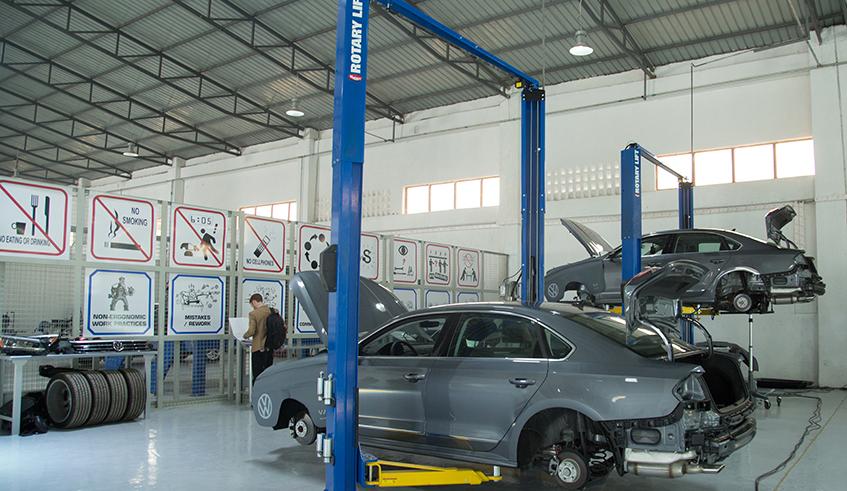Africa-Press – Cape verde. Experts argue that the automotive industry can leverage the African Continental Free Trade Area (AfCFTA) to scrape the continent off the tagline of being the ‘dumping site’ of old used vehicles.
Today, 77 percent of 329,000 light vehicles that the EAC needs per year are used vehicles, according to Serge Kamuhinda, CEO of Volkswagen Mobility Solutions Rwanda.
The long-term impact is quite sobering where EAC has a trade deficit of $2.8billion per year, only for the automotive sector.
“We have been flooded with used old vehicles and there is not a large enough market so that local supply can be viable…if you want to have a good production capacity, you need to have a strong local demand as well as external demand,” Kamuhinda claimed.
India has the same GDP as Sub Saharan Africa but the difference between the two, he said, is that India manufactures 3.2 million vehicles per year while in Africa it’s 1.1 million vehicles. “The difference is purely on the common external tariff and a concerted market that India has.”
“We need to look at electric and connected vehicles if we want to participate in the continental value chain that is able to be viable within the global value chain of the automotive industry,” Kamuhinda noted.
Serge Kamuhinda CEO of Volkswagen Mobility Solutions Rwanda during the interview . Photo by Sam Ngendahimana
The CEO said they are working closely with the African Association of the Automotive Manufacturers to build regional hubs, in a sense that one hub in East Africa will be producing one model of vehicles and another hub in West Africa for another kind of model. The end goal is to have cars sold on the continent with enough market size.
He added that there is work in progress to have 40 percent of rules of origin under the AfCFTA, meaning vehicles produced on the continent will have 40 per cent local value addition. “Otherwise, there are not enough incentives for the industry to make investments.”
Asked whether Africa has the capacity to manufacture its own vehicles, Andrei Gromyko, owner of an automobile research center in Rwanda, said that unless people invest in acquiring knowledge and skills needed, currently, “we don’t have the capability and resources to manufacture vehicles from scratch.”
However, he pointed out that what advanced economies in the automobile industry normally do is buy a license from a firm to fully own a certain vehicle model and continue production until they reach a point of gaining the know-how and skills of producing them from zero.
‘The future is electric’
China, the biggest car market today, shows that 40 per cent of car sales will have to be electric by 2030 and recently, the European Union parliament decided that by 2035, they will phase out combustion engine cars and the same for the United States, where 50 per cent of car sales will have to be electric by 2030.
“In eight years, the industry is going to shift and of course, no one is going to invest in a plant that takes a lot of years to return on investment for the technology that is obsolete (that is Internal Combustion Engine),” kamuhinda said.
With an annual vehicle growth rate of 12 per cent, Rwanda has put in place a number of incentives that will apply to electric vehicles, plug-in hybrid electric vehicles and hybrid electric vehicles to drive e-mobility adoption.
These include; exempted import and excise duties on electric vehicles, spare parts, batteries and charging station equipment.
The incentives also include zero-rated Value Added Tax for electric vehicles, spare parts, batteries and charging station equipment.
Ordinarily, vehicle imports have to settle a bill of 25 per cent import duty, 18 per cent VAT, 5 to 15 per cent excise duty, depending on the size of the engine.
Gromyko said that setbacks for the uptake of e-mobility, include the high cost of spare parts and maintenance which according to him, shouldn’t be a big concern given the environmental benefit e-mobility has and the fact that it’s where the world is headed.
Roopak Gorajia, Sales and Marketing Director at Akagera Motors Rwanda, said they have both hybrid electric and regular combustion vehicles, however, demand is higher for hybrid cars.
According to him, there is a lack of infrastructure for electric cars to rise in Rwanda. “For it to take shape, there needs to be more charging stations across the country, in places such as malls, banks, restaurants, certain office buildings, among others.”
Places where people can drive and easily charge their vehicles without worrying about mileage or only having to charge at home, he explained.
Gorajia said that incentives put in place are not enough, “even with zero per cent tax and duty, electric cars themselves are priced high compared to regular engine vehicles and electricity cost is also a challenge.”
“For electric cars, we will eventually get there but once electric charging infrastructure is in place, and for hybrid vehicles coming into the market, that will happen very quickly.”
In the long run, the government says the building code and city planning rules will include provisions for electric vehicle charging stations. This is expected to reduce the complexity of the process for interested parties.
‘Smart city’
Kamuhinda is of the view that the future of cars is going to be connected; basically, cars that are being manufactured today cannot be put on the road without a smart city.
“The focus of Rwanda on ICT will pay off. Within the next eight years, when those cars are going to be the majority, Africa will be stuck if it’s not building smart cities, it will not be able to import electric cars and combustion ones will become rare and more expensive.”
For More News And Analysis About Cape verde Follow Africa-Press






